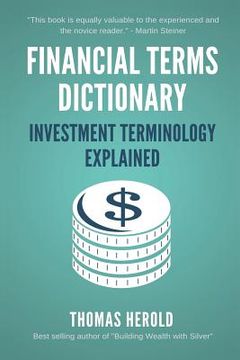Synopsis "Financial Terms Dictionary - Investment Terminology Explained"
Make Better Financial Decisions - Understand Investment Terms This practical financial dictionary for Investment terms helps you understand and comprehend most common Investment lingo. It was written with an emphasis to quickly grasp the context without using jargon. Each of the 332 Investment terms is explained in detail and also gives practical examples. It is based on common usage as practiced by financial professionals. Compiled over the last 3 years from questions and feedback to financial articles published by the Wealth Building Course education program. The Intelligent Investor This book is useful if you are new to business and finance. It includes most Investment terms for businesses, investors and entrepreneurs. It also covers the lingo that was introduced in the financial crisis of 2008 until 2017. With the alphabetical order it makes it quick and easy to find what you are looking for. Financial Dictionary Series Additional financial dictionaries are available in this series. Please also check out: Accounting, Banking, Retirement, Corporate Finance, Economics, Laws & Regulations, Real Estate & Trading. Click on the author name to see them. Example: What are Corporate Bonds? Corporate bonds are debt securities that a company issues and sells to investors. Such corporate bonds are generally backed by the company's ability to repay the loan. This money is anticipated to result from successful operations in the future time periods. With some corporate bonds, the physical assets of a company can be offered as bond collateral to ease investors' minds and any concerns about repayment. Corporate bonds are also known as debt financing. These bonds provide a significant capital source for a great number of businesses. Other sources of capital for the companies include lines of credit, bank loans, and equity issues like stock shares. For a business to be capable of achieving coupon rates that are favorable to them by issuing their debt to members of the public, a corporation will have to provide a series of consistent earnings reports and to show considerable earnings potential. As a general rule, the better a corporation's quality of credit is believed to be, the simpler it is for them to offer debt at lower rates and float greater amounts of such debt. Such corporate bonds are always issued in $1,000 face value blocks. Practically all of them come with a standardized structure for coupon payments. Some corporate bonds include what is known as a call provision. These provisions permit the corporation that issues them to recall the bonds early if interest rates change significantly. Every call provision will be specific to the given bond. These types of corporate bonds are deemed to be of greater risk than are government issued bonds. Because of this perceived additional risk, the interest rates almost always turn out to be higher with corporate bonds. This is true for companies whose credit is rated as among the best. Regarding tax issues of corporate bonds, these are pretty straight forward. The majority of corporate bonds prove to be taxable, assuming that their terms are for longer than a single year. To avoid taxes until the end, some bonds come with zero coupons and redemption values that are high, meaning that taxes are deferred as capital gains until the end of the bond term. Such corporate debts that come due in under a year are generally referred to as commercial paper. Corporate bonds are commonly listed on the major exchanges and ECN's like MarketAxess and Bonds.com. Even though these bonds are carried on the major exchanges, their trading does not mostly take place on them... Note: This example description is shorted due to publish restrictions. Each term is explained with 600 words and more.

